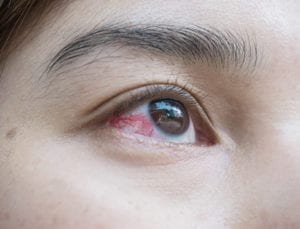 Chronic eye irritation is a complaint that eye doctors tend to hear more frequently than others. Patients express that their eyes feel scratchy or gritty; that they feel wet or are watering so much that they need to be patted dry several times a day. These sensations may coincide with redness and burning or itching, as well. Furthermore, these sensations may indicate one of two common problems: allergies or dry eye disease. Here, we want to discuss how we may differentiate between the two.
Chronic eye irritation is a complaint that eye doctors tend to hear more frequently than others. Patients express that their eyes feel scratchy or gritty; that they feel wet or are watering so much that they need to be patted dry several times a day. These sensations may coincide with redness and burning or itching, as well. Furthermore, these sensations may indicate one of two common problems: allergies or dry eye disease. Here, we want to discuss how we may differentiate between the two.
Dry Eye Disease
When the eyes are chronically dry and irritated, we often hear this described as dry eye disease. We don’t know if we would call it a disease, per se, but we can’t deny that dry eyes can be a significant problem for many people.
Chronic dry eye relates to the quality of tears. Tears are not a simple fluid; they are a delicate balance of water, mucin (mucus), and lipids (oils). Each aspect of tears is vital to the general comfort of the eye. The outermost layer of tears is made up of lipids, oily products that prevent rapid evaporation of water. Lipids are made in the Meibomian glands located at the edge of the eyelids. Usually, chronic dry eye relates to a deficiency in the production of lipids in these glands.
Allergies
Dry eye and allergies are similar in most symptoms, except for one. When allergies are the cause of grittiness and watering, patients also often complain of itching. Allergies may affect the eyes and the nose, causing sneezing and sniffling. Depending on the type of allergy, a certain amount of redness and swelling may also occur.
Allergies may occur due to an environmental factor such as pollen or animal dander, to food or chemicals, or other substances. Often, an allergic reaction is manageable, but some patients do require medical evaluation, testing, and treatment to manage chronic or severe allergies.
Treating Eye Irritation
The reason we want to differentiate between dry eye and allergies is that each of these conditions responds to specific treatment. For example, most people with allergies experience a degree of relieve with the use of antihistamine medication. Ongoing allergies can be identified through testing so allergens can be avoided as much as possible. For temporary relief of ocular allergy symptoms, some patients may use lubricating eye drops.
The chronic dry eye is something we need to look at closely. Conservative treatments may include lubricating eye drops formulated specifically for the symptoms of dry eye disease. These eye drops or other supplements are typically geared toward improving the lipid layer of tears. Additionally, in more severe cases, we may recommend that the tiny tubes that drain tears from the eyes be plugged.
Dry eyes and allergies may not affect long-term eye health. They do affect your everyday quality of life, though, and should be treated appropriately. For more information on dry eye treatments, call our Ocala office at (352) 237-8400.
